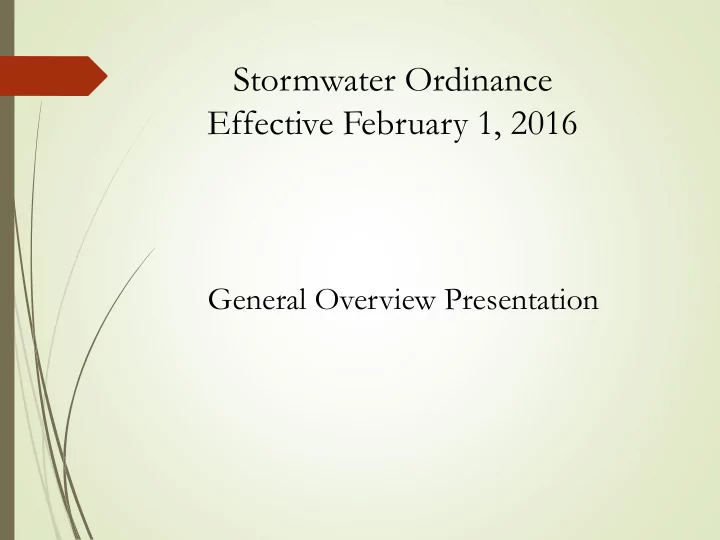

Stormwater Ordinance Effective February 1, 2016 General Overview Presentation
Stormwater Regulations Short History Floodplain standards per federal requirements (late 70’s) Detention requirements (mid to late 90’s) Stormwater standards (late 90’s) New Growth Area Standards (2005) Preservation of minimum corridors City wide No net rise/fill within the New Growth Areas Salt Creek Storage Area Standards (2006) No Net Fill/Rise Policy for City subsidized projects (mid 2000’s)
NDEQ Stormwater Requirements
2012 Task Force
Ordinance 28.03 Regulations for Post Construction Stormwater Management Manage water quality events Waiver for developments that have planning commission approval (e.g. preliminary plat approval) prior to February 1, 2016
Ordinance Requirements Management of all rainfall events for development and redevelopment projects over one acre 0.83 inches or less for development projects (80% event) 0.62 inches or less for redevelopment projects (70% event)
Ordinance Requirements Not required for: Individual lots (under one acre) Developments with preliminary plats or redevelopments with building permits approved prior February 1, 2016 Director granted exemptions
Ordinance Requirements Inspections/Maintenance Property owner required to inspect and maintain Best Management Practices Inspections by qualified individual Maintenance agreement needed prior to obtaining building permits City will inspect periodically
Ordinance Requirements Replacement City to replace if shown that Best Management Practice was properly designed, installed, inspected and maintained
Ordinance Requirements Credits Credits available within each watershed (e.g. Beal Slough, Antelope Creek, etc) Credits for managing stormwater above the criteria amount Credits for using conservation design practices
Best Management Practices Rainfall events would be managed by the use of Best Management Practices Development projects Wetlands Extended Detention Basins Retention Basins
Submerged Wetland Wetland
Retention Pond 13
Best Management Practices Rainfall events would be managed by the use of Best Management Practices Development/Redevelopment projects Green Roofs Permeable Pavements Bioretention Facilities Others
Green Roof
Bioretention
Permeable Pavements
Design Storage Volume/ Release Rates BMP Facilities shall be adequate to hold the WQCV Generally release rates are over a 24 to 40 hour period For extended detention ponds, both water quality and quantity will be drained with 72 hours Retention ponds and subsurface BMPs will be drained between 12 and 40 hours
Submittals Water quality control form (Appendix 8.1 in the drainage criteria manual) Plans Calculations and Descriptions as necessary Maintenance Plan
Land Redevelopment Project Examples Building permit approved on or after 2/1/16 with more than one acre of disturbance Amendment to existing use permit to change one acre or more of existing parking lot and building to new building and parking (building permit approval on or after 2/1/16)
Land Development Project Examples Amendment approved on or after 2/1/16 to approved PUD adding one are or more of agricultural land to future residential. Added area subject to ordinance 28.03 Amendment approved on or after 2/1/16 to approved PUD that completely revises street and lot layout of one acre or more New acreage subdivision outside city limits but within 3 mile jurisdiction approved on or after 2/1/16 Amendment approved on or after 2/1/16 to approved CUP that revises grading of one acre or more
Exemption Examples New use permit one acre or greater approved on or after 2/1/16 for existing commercial facility where disturbing less than one acre for second building and additional parking Amendment to special permit on or after 2/1/16 where the initial special permit was approved prior to 2016 but doesn’t change the site plan (e.g. adjustment to height or parking) New PUD for residential/commercial development approved January 2016 (approved prior to 2/1/16)
Benefits besides improving water quality reduces stream bank erosion reduces localized flooding increased base flows more biodiversity sustainable practice healthy lifestyle less maintenance promotes aquatic & riparian habitats 23
Developer Benefits can reduce grey infrastructure costs increases lot aesthetics more sustainable more marketable
Watershed Management For more information contact Ben Higgins watershed@lincoln.ne.gov 402-441-7589 lincoln.ne.gov (keyword ‘clean water’)
Recommend
More recommend